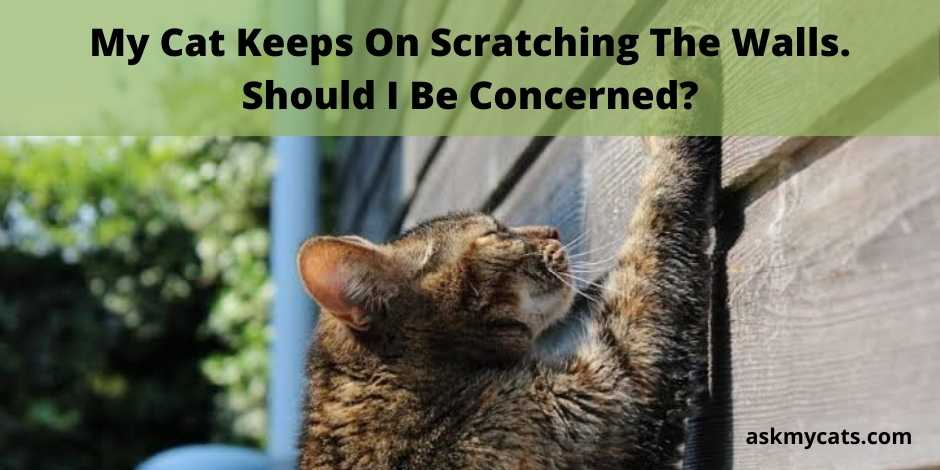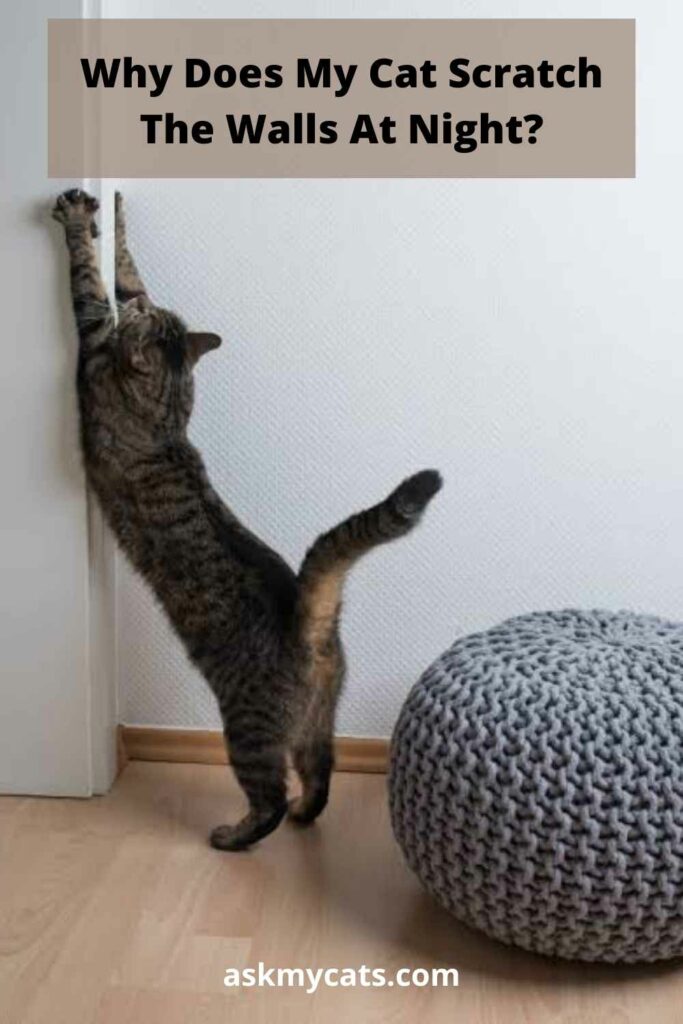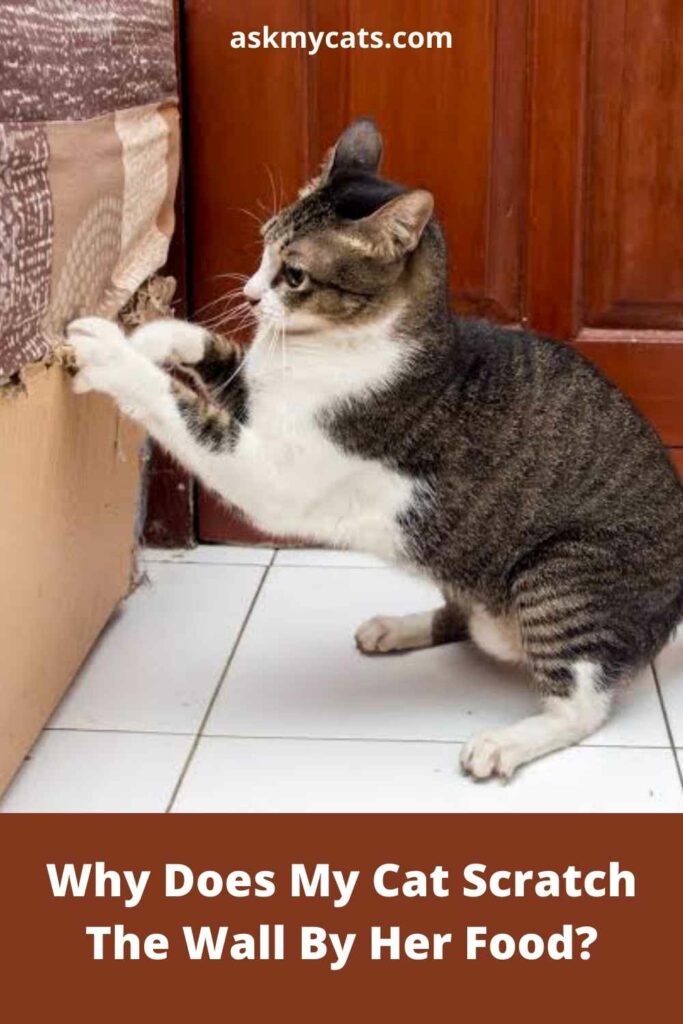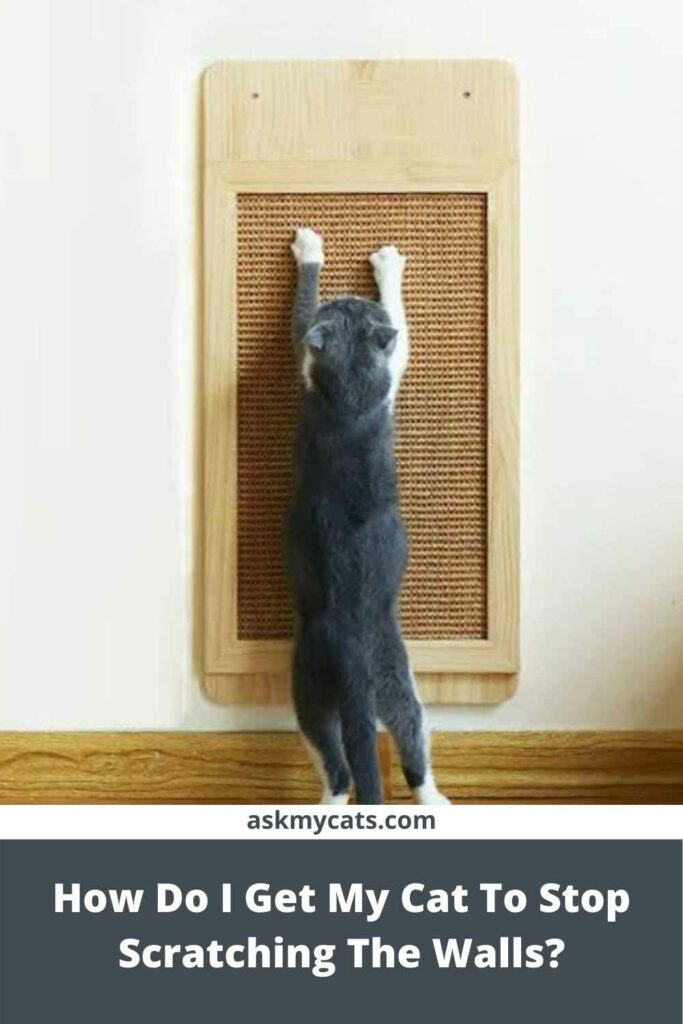Are you losing sleep at night because your cat won’t stop meowing and scratching at the walls? If you’re becoming upset over your cat clawing up your walls at night, you might want to learn why and how to stop it.
Your cat may be scratching your walls for a variety of reasons. For instance, the presence of termites or mice in a hollow wall, honing their claws, burying food, or even as a result of fear. You must determine which one it is in order to determine what to do.
Keep reading if you want to learn more about your cat’s aggressive and weird behavior.


Give Your Cat the Perfect Day
Get the Free Ebook!
Why Does My Cat Scratch The Walls At Night?
Cats are naturally active and alert at night, which might make it difficult for you to sleep. They may want to play, explore, eat, itch, or want your attention.
These behaviors can be extremely loud and may wake you up. Some cats are also very lethargic during the day. As they didn’t waste much energy during the day, they may want to burn it at night.
We’ll now discuss the various reasons why your cat scratches the walls:

1. Marking Their Personal Territory
Your cat’s fragrance is her hallmark in the house and one of the ways she confirms her presence to the other pets is by scratching an area of your house.
Cats have smell glands throughout their bodies, particularly in their faces and paws. So scratching the walls is one of the ways the cat asserts its dominance over that area of the house.
Cats scratch in numerous situations including when a new pet or a newborn enters the household. It might also be a normal reaction to the changes in its surroundings, such as moving out, getting new furniture, or simply having new people around. Any small change could set off clawing in cats.
Those scars left behind when your cat scratches the wall serve as a visible signal to all of the house’s pets, declaring its dominance over that region and prohibiting any other pet from approaching it.
If the pets in the house are calm, those markings will alert them and cause them to leave the area, averting further battles.
2. Claws Maintenance
Another explanation for scratching, particularly in indoor cats, is claw upkeep. Cat scratching walls sharpens the claws and keeps them ready to use.
When your cat scrapes a hard surface, the outer weak coating enclosing its claws disappears, making way for a newer, sharper one. It’s an inherited trait from their ancestors who liked to maintain their claws sharp at all times in order to hunt and rip their prey apart.
Of course, your cat does not scratch to hunt like their forefathers did but it is hardwired in them. They were born with this behavior. Cats also benefit from keen claws as they use them to climb trees as well as to protect themselves.
Also, check out Why Does My Cat Sit In The Corner And Keep Staring?
3. The Stress Factor
Cats are extremely sensitive creatures and even slight changes in their environment or daily routine can cause them to become stressed. Scratching the walls is your cat’s method of comforting herself by declaring her territory.
As previously said, even the birth of a baby or a new pet in the household can cause stress and cause your feline friend to become territorial.
Otherwise, numerous factors might be causing her worry, such as a significant shift in the owner’s schedule or just rearranging the house. Any small change in circumstances may cause stress.
4. Expressing Emotions
Your cat may scratch to show her happiness, dissatisfaction, or any other emotion. Cat scratching walls might be a method for your cat to express herself.
Cats may scratch on surfaces to indicate that they are content with their environment. It’s the human equivalent of hand clapping. When a cat is pleased with its surroundings, it will engage in a variety of playful behaviors.
Happiness-instigated scratching occurs most often when a cat is full of contentment. A well-fed cat has plenty of energy to expend.
If rolling on the grass, pawing in the air, or playing its favorite activity doesn’t allow it to release all of the energy stored within it, the cat will become agitated and start scratching the wall.
5. Boredom
Cats may scratch walls out of boredom at times. If you have pampered her so much that she becomes bored with all of the nice things you have brought her, she may scratch the walls out of boredom.
Or it may be that she isn’t pampered but just doesn’t have enough things to play with while you’re not there. Bored cats frequently spend time doing useless activities around the house to entertain themselves and expend their energy.
If they do not move enough or if you do not have enough time to play with them on a regular basis, scratching your walls might turn out to be an intriguing pastime for them.
6. Unfamiliar Scent
According to studies, cats scratch more when they smell the pheromones of the previous cat scratching the walls. Your cat strives to get rid of any intruder’s fragrance in the house by clawing anything that smells like the previous cats.
7. The Mirror Effect
When your cat scratches reflective surfaces like mirrors and windows, it’s usually because it’s attempting to find out who’s on the other side of the surface. She may believe there is another cat on the other side if she sees his reflection.
8. The After Littering Ritual
Cats are known to scratch the floor after they have finished eating using the litter box. This might be due to the litter box being too small or the litter being too little.
If there isn’t enough litter, your cat may claw all over the floor to attempt to locate a place to hide her excrements so that other cats won’t be able to smell her.
9. Burying Food For Later
In certain situations, cat scratching walls may be caused by the urge to hide food for later use. In the wild, cats have an innate propensity to hoard food for later when there is no prey.
Also, the meal may have had a foul odor that the kitten couldn’t stand it and preferred burying.
Interesting Read: Do Male Cats Scratch More Than Female Cats?
Why Does My Cat Scratch The Corner Of The Wall?
Your cat may scratch the corner of the wall in order to keep her claws functional. Having sharper claws helps her protect herself and remain vigilant.
It’s possible that your cat scratches the wall in order to maintain her claws healthy and working properly.
In addition, scratching a hard surface like a wall erodes the outer husk’s points over time. Under each claw’s broken outer shell, new, better, and sharper nails are developing.
Why Does My Cat Scratch The Wall And Meow At Night?
Meowing at night might be an indication that your cat is energetic, interested, and enjoys playing. Cats will do many things to get attention, including scratching at your bedroom door, pawing at you, and bumping into you. This also includes meowing.
In addition to scratching walls out of anxiety, cats will also meow.
Because anxiety-related scratching can evolve into a full-blown mental illness, it should always be handled very seriously.
When you return home after a lengthy absence, it’s essential to pet your cat. She will feel loved and cared for which may encourage her to give up harmful scratching.
You may not have been gone for long at times but a little change in your routine, such as a party, a modest house renovation, or even a new perfume might throw your cat off balance and cause it to claw everything.
Why Does My Cat Scratch The Walls Of Her Litter Box?
Cats who scratch the floor or the wall after using the litter box are typically expressing a remark about the litter box or the litter that is being used.
Often the cat box might be too small for the cat or there might be insufficient litter or too much litter in the cat box. If the litter box isn’t clean enough cats will sometimes indulge in this activity.
The behavior of scratching the litter box may be caused by the size of the litter box or the litter itself. The cat will scratch if the litter box is too tiny. Similarly, if the litter amount is too small or too large, the cat will scratch. It’s an expression of dissatisfaction with its trash.
The cat litter should ideally be around 3 inches deep. This is deep enough for the cat to bury her feces completely. Litter boxes must also be scooped every day and thoroughly dumped, cleaned, and replaced with fresh litter every few weeks.
The majority of commercial litter boxes are too tiny for cats. We recommend that you use a 66-quart uncovered Sterilite storage container.
These are huge, transparent storage containers that the cat can easily turn about in and dig into her heart’s delight once filled with roughly 3 inches of litter.
Why Does My Cat Scratch The Wall After Eating?
A cat may scratch on the wall to hide its food for later, especially if it has eaten its fill. It’s a habit acquired by cats from their wild ancestors who would bury their food to consume later when prey was scarce.
Another reason why a cat scratches the wall just after eating is that the cat dislikes the smell of the meal.
As a result, it may be attempting to conceal the unpleasant odor by burying it in the wall.
If it is the food the cat dislikes, you won’t observe this behavior if you feed it something else.
Why Does My Cat Scratch The Wall By Her Food?

If your cat is scratching around her bowl like she’s trying to dig or bury something, there’s nothing wrong with your feline.
However, here are the reasons why your cat scratches the wall with her food after eating:
1. Your Cat Conceals The Odor Of Her Food
Your domestic cat’s natural habit is one of the reasons she tries to conceal food leftovers. In doing so, she wishes to conceal the scent as it may signal to predators that she has been present.
Cats are obligate carnivores, which means they must hunt for food in the wild. They obtain food leftovers from hunting and they need to hide them so other predators don’t find them.
2. She Protects Kittens
If you have a female cat with kittens at home, she will bury the food to protect her children from other predators. A cat uses her own smell to keep others from discovering that there are kittens around.
3. You Give Her Excessive Food
Cats scratch at food scraps. If you find your cat scratching her food, it might mean she has more food than she can consume.
A cat perceives the extra food as something she will not return to, therefore she naturally tries to bury it. As a responsible and caring cat parent, you must regulate how much food you serve your cat in order to avoid undesirable behavior and other health concerns.
4. To Keep Her Surroundings Clean
Another reason your cat may hide her food is her natural neatness. Most felines are creatures who are obsessed with cleanliness, therefore they work hard to be immaculate and keep their surroundings clean.
So, perhaps your cat scrapes around food in an attempt to clean up her area.
Also, find out why does my cat scratch the tv
How Do I Get My Cat To Stop Scratching The Walls?
The solution you devise to keep your feline friend from scratching items must address the underlying source of the problem. As a result, you should first figure out what is causing your tiny furry companion to scratch on walls and other items.
The following are some tips you can employ to redirect destructive scratching habits.

1. Trim Your Cat’s Nails
Regularly trimming your cat’s nails can greatly lessen their need to scratch on walls. If a cat’s nails are sharp and overgrown, it will instinctively desire to claw at things.
Trimming your cat’s nails, on the other hand, is no easy task. This is due to the fact that the nails are extremely delicate and even a little paw can create significant wounds in your palm.
First, you must gain the cat’s confidence so that she can lie motionless while you perform the activity. Also, select a moment when the cat is most comfortable and cut the nails softly with clippers developed particularly for cat claws.
2. Get Your Cat A Scratching Post
When it comes to scratching, the best strategy is not to attempt to stop your cat from scratching but rather to educate her where and what to scratch. Providing her with suitable, cat-attractive surfaces and items to scratch, such as scratching posts, is a good strategy.
The following steps will help you encourage your cat to scratch where you want her to:
- Make available a range of scratching posts with varying quality and surfaces. Give your cat scratching posts made of cardboard, carpeting, wood, sisal, and upholstery.
- Some cats prefer horizontal posts over vertical posts. Others may choose vertical or sloping posts.
- Once you’ve determined your cat’s scratching preferences, place more scratching posts in strategic areas. Remember that all cats prefer a solid post that will not shift or collapse when utilized.
- Most cats like a post that is tall enough for them to stretch entirely. Encourage your cat to examine her posts by sprinkling catnip on them, hanging toys on them, and positioning them in locations where she may be tempted to climb on them.
- Remove or hide other appealing things to discourage inappropriate scratching. Place plastic, double-sided adhesive tape, and sandpaper on furniture or the floor where your cat could stand to scratch it. Scratching posts can be placed next to these artifacts as “legitimate” alternatives.
3. Pheromone Therapy
Because cats frequently scratch surfaces in reaction to pheromones left behind by other cats, pheromone treatment can be used to lessen stressful and unpleasant scratching behavior.
Synthetic versions of the cat’s natural pheromones are used in pheromone therapy to make your cat feel more comfortable during stressful conditions.
You simply need to sprinkle some loose catnip on the areas that the cat scrapes to attract the cat to those surfaces. Once the cat arrives and takes up “its smells,” it will stop clawing the poles.
You may also gather natural pheromones from your cat by softly stroking their cheeks with a soft piece of fabric. Then you massage the accumulated odor on surfaces around the cat’s spot.
Once the cat detects familiar odors, there will be little incentive for it to scent-mark the surfaces again, and scratching will be much decreased.
4. Explore Outdoors
A cat clawing walls and meowing may be an indication of too much restriction. Perhaps the cat finds its play place to be too small and unsuitable for its enthusiasm. In such instances, you may want to look into alternate techniques of assisting the cat in getting rid of extra energy.
You could, for example, go on a stroll with the cat or play in the backyard. Nothing beats outside activities for allowing cats to burn off extra energy.
You must like to read about How to Fix Cat Scratches On Walls?
Frequently Asked Questions
Why Is My Cat Scratching So Much?
It is normal for cats to scratch objects in their environment. Most cats are meticulous groomers and they do so in order to sharpen their claws. However, if you are concerned about your cat’s excessive scratching, consult a veterinarian.
Should You Prevent A Cat from Scratching?
Pawing or scratching around is not inherently dangerous. It’s your cat’s instinctive habit to keep safe and conceal her existence from other predators. In fact, some cat owners find such behavior amusing.
What Should You Do If A Cat Scratches You And Draws Blood?
1. Wash the wound gently with soap and water.
2. Apply pressure with a clean towel to stop bleeding.
3. Bandage the wound.
4. Visit a veterinarian.
How Much Litter Should I Put In A Litter Box?
It is recommended that you pour two to three inches of litter into your cat’s litter box. If your cats are deep scratchers, pour a little more.
Final Words
Clearly, cats scratch walls or other surfaces for a variety of reasons.
As the behavior is more ingrained, it is more difficult to break. Fortunately, you may substantially redirect the habit by using a variety of the treatments mentioned in this article.
If your cat just cannot overcome this bad behavior, you should seek the advice of a competent veterinarian. There might be an underlying medical problem causing your cat to scratch more persistently and frequently than it should.
Feel free to drop your queries regarding your furry friend in the comment section below!
Also, check out Why Does My Cat Scratch the Window?
